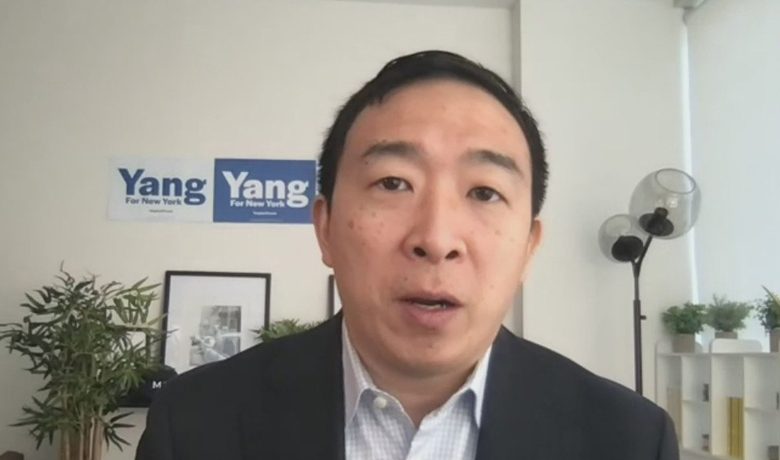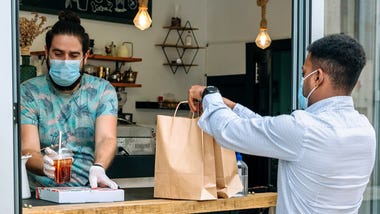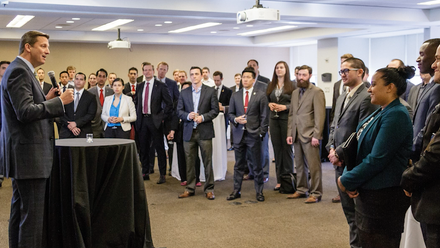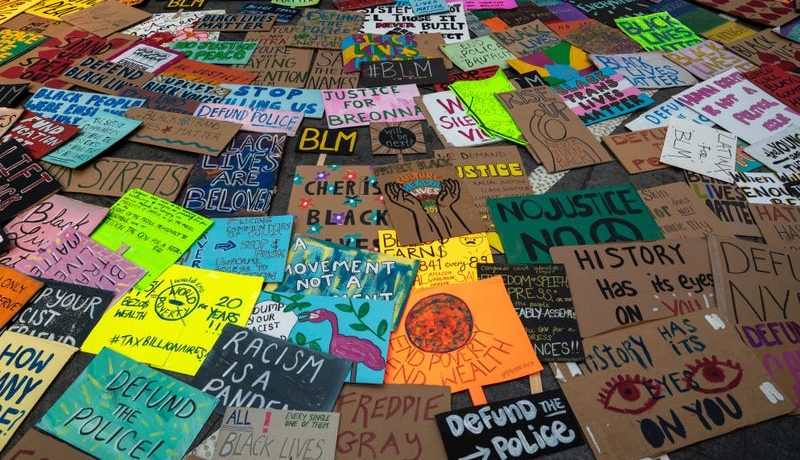
Neil A. Carousso produces NewsNation original “Kurt’s Country” – a celebration of country music and a slice of Americana with host Kurt Bardella.
-
WATCH: NYC Mayoral Candidate Andrew Yang Calls on Cuomo to Step Aside, Lays Out Plans for City’s Recovery
Posted by: Neil A. CaroussoPost Views: 940By Lynda Lopez, WCBS Newsradio 880
NEW YORK (WCBS 880) — Andrew Yang, the leading candidate for mayor of New York City, is concerned local government is handicapped while state lawmakers in Albany investigate the mounting claims of sexual harassment and assault against Gov. Andrew Cuomo.
New York State Attorney General Letitia James and the feds are also investigating whether Cuomo intentionally underreported COVID-19 deaths in nursing homes.
Yang has sent a letter to Cuomo asking him to step aside while the investigations play out and he believes that remains the best path forward.
“We need someone who can do the work of the state and right now that does not seem to be Gov. Cuomo,” Yang said. “I sent a letter asking him to step aside and have the lieutenant governor assume that role pending the conclusion of the investigation, I think that’s the right move, I think that would make everyone feel satisfied that there is someone who is able to lead the state, frankly, not distracted by a continuous drumbeat of accusations and scandals.”
In a wide-ranging interview for the 880 Weekly Rewind, the entrepreneur and former presidential candidate told anchor Lynda Lopez that the governor and his scandals have become a distraction and are getting in the way of the city’s recovery.
“The job of the mayor is to deliver for the people of New York City and in order to deliver for the people of New York City, you need to have a good working relationship with the governor and the legislators in Albany. If you don’t have that, then you can’t deliver at high a level,” Yang said. “I talked to a state legislator last night and he said that obviously everything is focused right now on these proceedings against the governor and a lot of other business. Ordinarily right now they’d be focused on the budget, which is enormously important, but that’s not happening right now. So the interests of the city and the state are aligned in the sense that the city is the economic engine of the state, but we need state legislators to be doing their jobs in order for us to be able to do our jobs so it’s one reason why I think Gov. Cuomo stepping aside is the right thing because we need them focused on the business of the state and that affects the city every day.”
Cuomo on Friday again denied the sexual harassment allegations and insisted that he would not resign, despite growing calls from both political opponents and allies to do so.
The governor said he doesn’t want to let the allegations be a distraction, and will remain focused on the state budget, the state’s recovery, and ramping up vaccination efforts.
With his sights set on Gracie Mansion, Yang is fully focused on jumpstarting the economy and bringing the city back.
“We’re down 60 million tourists and those 60 million tourists supported 300,000 jobs, about half of the jobs we’re missing, so the first order is business is to let everyone know that New York City is open, that we’re welcoming tourists back,” Yang said. “The second thing that everyone can also see around us is we’re missing 82% of commuters and when someone doesn’t come into the office, that’s not just that company, that’s the security guards, the cleaning staff, the food truck operators, the retail storefronts that ordinarily serve those commuters. We need to let companies have the confidence to say to their workers, ‘You need to come back to the office’ because that’s vital for New York City’s recovery.”
Yang said that he’s been talking to CEOs who are desperate to get people back as soon as the vaccine is distributed broadly enough.
But that will require building public confidence that it’s safe to come back and Yang said the best way to accomplish that is by letting people know that everyone around them has been fully vaccinated.
“There are two straightforward possibilities number one is to have an app on your smartphone that’s a vaccine passport,” Yang said. “Israel, which is actually ahead of us on this curve, has actually started distributing bracelets to people where you just have the bracelet and you show the bracelet. It’s like New York City is the biggest VIP section of a club in history where you get the bracelet so you can walk on in. But that’s the kind of measure that we need to adopt and champion for people to feel confident that they’re perfectly safe cause everyone around them has already been vaccinated.”
https://omny.fm/shows/880-weekly-rewind/embattled-cuomo-yang-on-why-he-wants-to-be-mayorNeil A. Carousso produces The 880 Weekly Rewind with Lynda Lopez Friday nights at 7 PM on WCBS Newsradio 880. Listen to this week’s full show on the media player above.
-
Small Business Spotlight: How a Bed-Stuy Wine Shop Became the Neighborhood Everything Store
Posted by: Neil A. CaroussoPost Views: 935By Joe Connolly and Neil A. Carousso
NEW YORK (WCBS 880) — A small wine shop in Bedford-Stuyvesant is tailor-made for the Brooklyn community it serves.
Happy Cork opened its doors in March 2019 – a year before the coronavirus spread in New York City and changed its business model. Fast-forward two years and Sunshine Foss is displaying her sunny disposition on the WCBS Small Business Spotlight, sponsored by Dime Community Bank.
Foss told Joe Connolly and Neil A. Carousso she rallied her community amid the business shutdowns and offered to sell their products on the new website she designed herself. She was in survival mode.
“When we opened, it was literally us trying to get people in the doors,” she said.
An average of just 10 people a day patronized Happy Cork for the first few months of the pandemic.
Liquor stores were deemed an essential business, so Foss used that designation to support minority and women-owned businesses in Brooklyn.
“We’re like, ‘Okay, we’re going to have you in the store. We’re essential. You’re going to be essential,'” she recalled saying. “A lot of businesses have been able to grow even just because of that.”
Her wine shop became a destination both in-person and online. She currently boasts dozens of locally sourced selections from women and Black owners who have struggled to stay open, sharing the story of each product she sells.
“We want to make sure that you get that Happy Cork experience,” Foss said.
“If you’re not coming into the store, we’re going to send you an experience in the box.”Along with wine orders, Happy Cork ships coasters, glassware, tea, chocolate, keychains and merchandise from local artisans and vendors.
“Now, with opening up delivery and shipping and a beautiful online presence, we have definitely been able to kind of capture a lot more of an audience so business has been great,” she said.
But, Foss credits her vendors and local business owners for what she has learned along the way. She channels her Bed-Stuy community in brand and spirit.
The Happy Cork website reads, “There’s a difference between a place where you are welcome and a place that was built with you in mind.”
Foss told Connolly and Carousso she wanted to make her shop less “intimidating” from other urban wine shops that featured bullet proof glass where she places flowers.
“It is really a space that was built with the community in mind,” she said.
“It was built for the community to come in (and) feel welcome.”See how Happy Cork is supporting other Brooklyn businesses on the Small Business Spotlight video above.
-
Small Business Spotlight: Software Tailored for Restaurants Hones New COVID Sales Strategy
Posted by: Neil A. CaroussoPost Views: 894By Joe Connolly and Neil A. Carousso
NEW YORK (WCBS 880) — Restaurants are trying to get control over their destiny.
SevenRooms, co-founded in 2008 by Joel Montaniel, created backend software for restaurants and hospitality companies to streamline ordering and reservations. Now, they are more of a data-driven technology company helping restaurateurs gain repeat customers in a precarious time for eating out.
“The most significant change that restaurant operators need is to have their own platform where consumers can order delivery directly from them,” Montaniel told Joe Connolly and Neil A. Carousso on the WCBS Small Business Spotlight, sponsored by Dime Community Bank.
He emphasized that control over takeout and delivery – the most common pandemic pivot in the food industry – will increase profit margins by saving commission many owe to third-party delivery apps such as Grubhub, Postmates, DoorDash and Uber Eats.
The second key for restaurants to recover, Montaniel believes, is capturing customer data internally, which SevenRooms’ software does, to upsell those who have placed orders. The technology company recently introduced digital menus to establishments that tracks order history.
“If you had opted into their marketing database, the SevenRooms system will automatically email you again, and say, ‘Hey Neil, here’s a complimentary tzatziki when you order delivery or pickup directly from us,’” he hypothesized using Carousso as a customer in his example. “So, it’s a great way to leverage what you’re actually doing inside the restaurant and use it as a benefit for you to order pickup and delivery or come back into the restaurant when you feel comfortable doing so.”
Montaniel told WCBS 880 that 64 percent of SevenRooms users prefer ordering directly from an establishment rather than third-party apps. He said many are eager to support their local eateries since the industry was largely shutdown due COVID-19 and remains open with strict safety restrictions.
That loyal customer base is essential to restaurants’ recovery. The SevenRooms co-founder and CEO labeled Domino’s Pizza the “gold standard” because they own their own application for contactless ordering, pickup and delivery.
SevenRooms counts Wimbledon, Live Nation Entertainment and Topgolf among its hospitality clients.
“They’re thinking about the world the same way, which is how do we create the best, most optimal, and now recently, safest guest experience and I think technology can play a role in that to make everyone feel safe,” Montaniel said of how they are looking to reinvent themselves as local venues reopen to fans for the first time in about a year.
See how SevenRooms is helping this hard hit sector survive on the video above.
-
Veterans Organization Builds Remote Talent Pipeline to Fortune 500 companies
Posted by: Neil A. CaroussoPost Views: 867By Neil A. Carousso
NEW YORK (WCBS 880) — The transition from the military to the workforce is often a challenge for veterans, but the pandemic has exacerbated that challenge. A non-profit organization based in Manhattan is taking up the task to virtually match vets and major U.S. companies.
“We’ve got some super smart people who enlist in the military and we wanted to create those pipelines for them to get into these Fortune 500 companies,” said Lt. Col. Michael Abrams, founder of FourBlock, who is currently serving in the United States Marine Corps Reserve.
FourBlock prides itself on preparing veterans for a career after service. The average salary for its national members is $92,811, according to the non-profit’s 2020 data.
“The companies that we work with are the ones who pay good salaries,” Abrams told WCBS 880’s Neil A. Carousso.
Since the pandemic hit, FourBlock pivoted from in-person networking events to virtual workshops and training on remote interviews.
Maxwell Acker-DeOliveira was looking for a job after recovering from COVID-19 in California where he was visiting family in May. FourBlock helped him prepare for remote job interviews with Deloitte in June – a process that happened rather quickly.
“I’m a social creature,” said Acker-DeOliveira, explaining Zoom meetings presented an obstacle for him to get over.
The Marine sergeant had been used to leading a six-man sniper team for five years. His deployment concluded in March 2018.
“You kind of have to push through that wall,” he said, adding, “You either network or you stay on the bench at Deloitte.”
Acker-DeOliveira was hired at the Big Four accounting firm within the month as a technology services optimization consultant.
Abrams said hiring managers understand they can trust veterans to take the initiative while working remotely.
“They’re not going to just sit around and wait to be told what to do,” he said, continuing, “They’re going to kind of figure out what needs to get done and get it done.”
Abrams emphasized it’s “trust and resiliency,” experience gained through their military service, that makes veterans attractive hires in the pandemic.
Watch the video above for more on this story.
-
State of Black New York: Racial Inequities in Social Justice and Civic Engagement
Posted by: Neil A. CaroussoPost Views: 691By Lynda Lopez, Marla Diamond and Steve Burns
NEW YORK (WCBS 880) — All this month, we’ve been shining a light on the details of a report on equity and race in New York City.
The New York Urban League’s “State of Black New York” raises significant questions on issues like the economy, technology, social justice and civic engagement.
The year 2020 was one of impassioned activism for racial justice as protesters took to the streets and occupied City Hall Park following the police custody death of George Floyd in Minneapolis.
According to the New York Urban League’s report, Blacks are still over-represented in prisons due to decades of over policing and racial bias, with Black youths making up 63% of the jail population.
Bail reform was one bright spot in a difficult year, said Jullian Harris-Calvin, director of the Greater Justice New York at the Vera Institute of Justice.
“I don’t know that we ever expected that bail reform is going to fix all of the racial injustices,” Harris-Calvin said. “It has been successful in many ways, but it has not fixed all of the problems with racism and inequity in the criminal legal process.”
The Vera Institute’s recently-released Empire State of Incarceration report found jail populations fell significantly in the first half of 2020, but the racial disparities grew.
“That obviously is something that we are not happy about and it was certainly an unintended result in terms of what the data shows,” Harris-Calvin said.
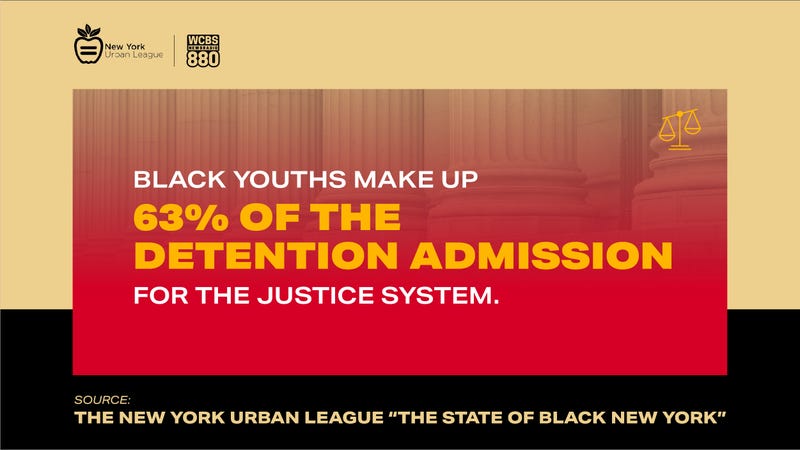
Much of the focus of criminal justice reform is on policing, the trial system and sentencing, said Alexander Horowitz, executive director of New Yorkers United for Justice.
“But where mass incarceration of Black and brown New Yorkers is most pernicious is a place where folks aren’t paying as much attention to, and that’s the back end of the system,” Horowitz said.
He tells Marla Diamond that Black and brown New Yorkers are less likely to be granted parole and when they are, they are 12 times more likely than whites to be jailed on a parole violation.
“We have to talk about who’s being granted parole, and who goes back and why, because if we continue to target Black and brown New Yorkers for reincarceration for non-criminal offenses then we are continuing this horrible legacy of the mass incarceration of Black and brown New Yorkers,” Horowitz said.
The New York Urban League’s report also tackles the question of civic engagement, which our reporter Steve Burns digs into this week.
He spoke with Chi Osse, who has gone from protester to protest leader to now City Council candidate in Brooklyn.
“It’s the craziest thing I’ve ever done in my life,” the 22-year-old said. “I realize that this is bigger than what’s happened in the summer, there’s a lot more to be done, and I’m going to be the one to do it.”
Osse was a ubiquitous sight during the protests last summer, holding court on megaphones and bullhorns across the city.
His announcement came just a few weeks later, channeling his activist energy into local politics.
“We need to bring our voice and our power to the polls,” he said.
At just 22 years old, Osse could represent the new model as we examine how to drive more widespread participation in local and national elections.
The New York Urban League reports voter turnout among African Americans has been trending downward and communities of color were more at risk of being undercounted in the census.
New York’s arcane voting laws also don’t help matters.
“Many New Yorkers would be surprised to know that some states all over the country and even in the south have some more progressive legislation on this front than we have,” said New York State Sen. Zellnor Myrie.
Myrie told WCBS 880 last month that it’s been his mission to take New York from worst to first as chair of the elections committee.
“We think more democracy is better,” Myrie said.
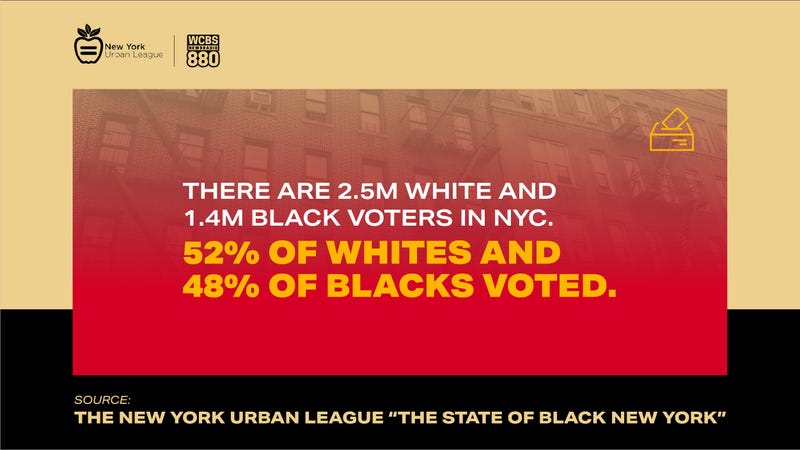
After a test run in 2020, lawmakers are now looking into allowing absentee or mail-in voting without needing a pre-approved excuse first.
“We almost have a culture of absentee voting now, something that very few voters utilized in the past has become one of the main ways that voters have partaken in their democracy,” Myrie said.
New York also enjoyed its first election season with early voting, opening the polls 10 days ahead of Election Day. This year marks the first test for another innovation in the city.
“Ranked choice voting is the process that is going to be used going forward in New York City local primary and special elections,” said Sean Dugar, who is in charge of education and outreach for Rank the Vote NYC.
He tells Burns that giving voters the option to rank their top five candidates instead of just one opens all kinds of civic doors.
“Ranked choice voting forces candidates to no longer talk to a small block of voters in hopes of getting elected, they have to talk to every voter in a district or in a city in order to get not just first choice votes, but second, third, fourth and fifth choice votes which may put them over the top,” Dugar said.
He believes the system levels the playing field and forces candidates to focus on policy rather than personality.
But it hasn’t been without controversy. Members of the City Council’s Black, Latino and Asian Caucus sued in an attempt to stop ranked choice voting this year claiming the outreach hasn’t been there for communities of color.
Dugar disagrees saying, “We’ve done trainings for community groups, we’ve had elected officials host public training, we’ve had the candidates themselves host public training.”
That injunction was struck down, but those council members are appealing.
On a foundational level, Osse said civics education has been lacking.
“I think we need to start educating the youth about not only how to vote and who your electives are, but also how to run,” Osse said, adding that he hopes to be a trailblazer for others, especially those who might not fit the traditional mold of a politician. “This is such a cliché, but be yourself and speak your truth.”
And to do that, there’s no better time than the present.
“If you have a vision and a voice and you have distaste for what’s happening in your neighborhood, or something next door, on your block, speak up about it and maybe there’s someone else that feels that same way about that issue,” Osse said.
As we end the month looking at the issues of race and equity in our community, we wanted to bring in another one of the candidates for mayor of New York City on the topic.
WCBS 880’s Lynda Lopez spoke to Brooklyn Borough President Eric Adams about the racial divide in our community and what he believe we need to do about it.
Lopez started the conversation by discussing civic engagement.
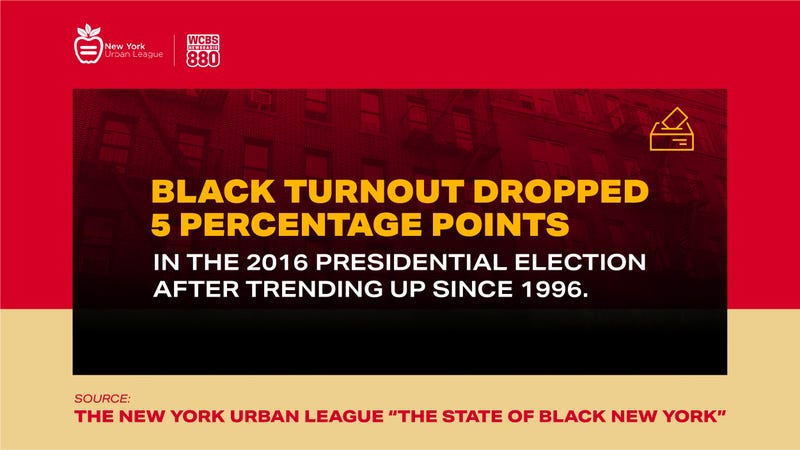
On a national level, there was an increase in engagement among Black voters from 1996 to 2016, and then it plummeted that year. In New York, we have our own voter patterns and issues.
Asked about the challenges in getting communities of color engaged in voting, particularly in a mayoral race, Adams said, “First we have to stop believing that engagement is something you could do in a spot way based on the campaigns that are taking place. It must be built into our school system, we must have an aggressive engagement plan while young people can see and understand how resources for their schools equate into who they elect and how they involve themselves civically, and allow them to volunteer and intern in governmental offices.”
He believes it should be part of the overall requirement in schools to understand local government.
Secondly, Adams said we need to speak with local stakeholders.
“We failed to do that and engage people in a language and the cultural norms that they will understand,” Adams said. “Those are two important areas that we can make real changes.”
Campaigning in the middle of a pandemic poses its own challenges, but Adams said he is continuing to engage voters on the ground.
“We have to give out literature to talk about our campaign, I’m still doing that, but this time I’m wrapping it in face masks and I’m giving instructions on how to avoid COVID-19. We’re standing at food pantries and giving out food and talking to people as we hand out food, not to politic, but just to let them know the consistency of delivering service to every day New Yorkers,” Adams said. “And really informing New Yorkers about those benefits that are available to them.”
Lopez also asked Adams about the social and criminal justice statistics laid out in the New York Urban League’s report, which showed that by 1992, Blacks and Latinos made up 92% of the New York state prison population.
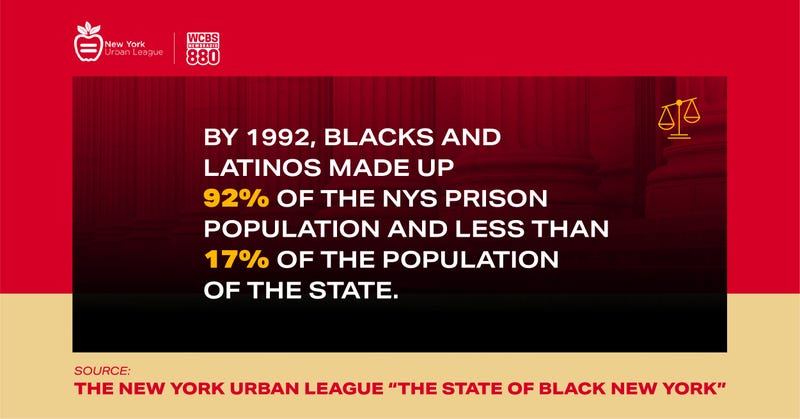
Adams, a former police officer, has more experience in policing in the city than his opponents. Other than the changes implemented in the wake of the summer’s protest, Lopez asked him what the city is now not doing to address the problem head on.
“We have to address the problem on three levels. Number one, real crime that takes place in this city happens in our school system. If you don’t educate, you will incarcerate. You have a failing school system, where 65% of Black students don’t meet proficiency. So if you go to Rikers Island and look at the numbers presumably 30% are dyslexic, 80% don’t have their high school diploma or equivalency diploma, 55% have learning disabilities and so really RIkers Island is a reflection of a failed educational system,” Adam said. “We need to go long term by improving our educational system and then we could do short term things such as foster care.”
He said hundreds of young people age out of foster care at 21 and only 12% will graduate for high school, 3% will enroll in college, and are more likely to be victims of crime or participate in crime.
“If we invest only $50 million a year and allow them to age out at 26 they are more likely to be productive citizens, not involve themselves in criminal justice behavior and really live a productive life,” Adams said. “We have to move from a reactive law enforcement plan to a proactive law enforcement plan and prevent crimes.”
Speaking to education, Adams said closing the digital divide is crucial to solving racial inequities.
“We need to engage into a real conversation about how the city gets involved in ensuring high-speed broadband. We can no longer leave it up to the private companies and entities. High speed broadband and access to internet is no longer a luxury, it is a necessity,” Adams said.
Adams said the people of New York City are not getting their money’s worth and he’s most focused on addressing those failures in his bid for mayor.
“They’re doing their job as taxpayers and they’re paying their taxes, government is not doing its job. Our city is dysfunctional and the dysfunctionality is in our agencies and those inefficiencies in our agencies, they’re leading to the inequalities and in many cases the injustices,” Adams said. “That’s why we see the continuation of Black, Brown, immigrant and poor people are constantly staying in systemic poverty and the goal is to get taxpayers’ dollars operating correctly and we do that by having our city and our agencies become more efficient and that’s what the next mayor must do. We can’t continue business as usual in a city that has had the business of locking out too many New Yorkers.”
Adams said he would be a “blue collar mayor” in the spirit of Fiorello LaGuardia. He believes that his life experience of growing up in poverty, working as a dishwasher and living on the verge of homelessness will help him lead the city because he is in a better position to understand what every day New Yorkers are going through.
“I think the next mayor must be a mayor that has gone through a lot so they could help people who are going through a lot,” Adams said. “It’s time for an everyday New Yorker that understands New Yorkers to help us get out of COVID-19.”
https://omny.fm/shows/880-weekly-rewind/the-j-j-vaccine-legal-weed-and-wrapping-up-racialNeil A. Carousso produces The 880 Weekly Rewind with Lynda Lopez Friday nights at 7 PM on WCBS Newsradio 880. Listen to this week’s full show on the media player above.


